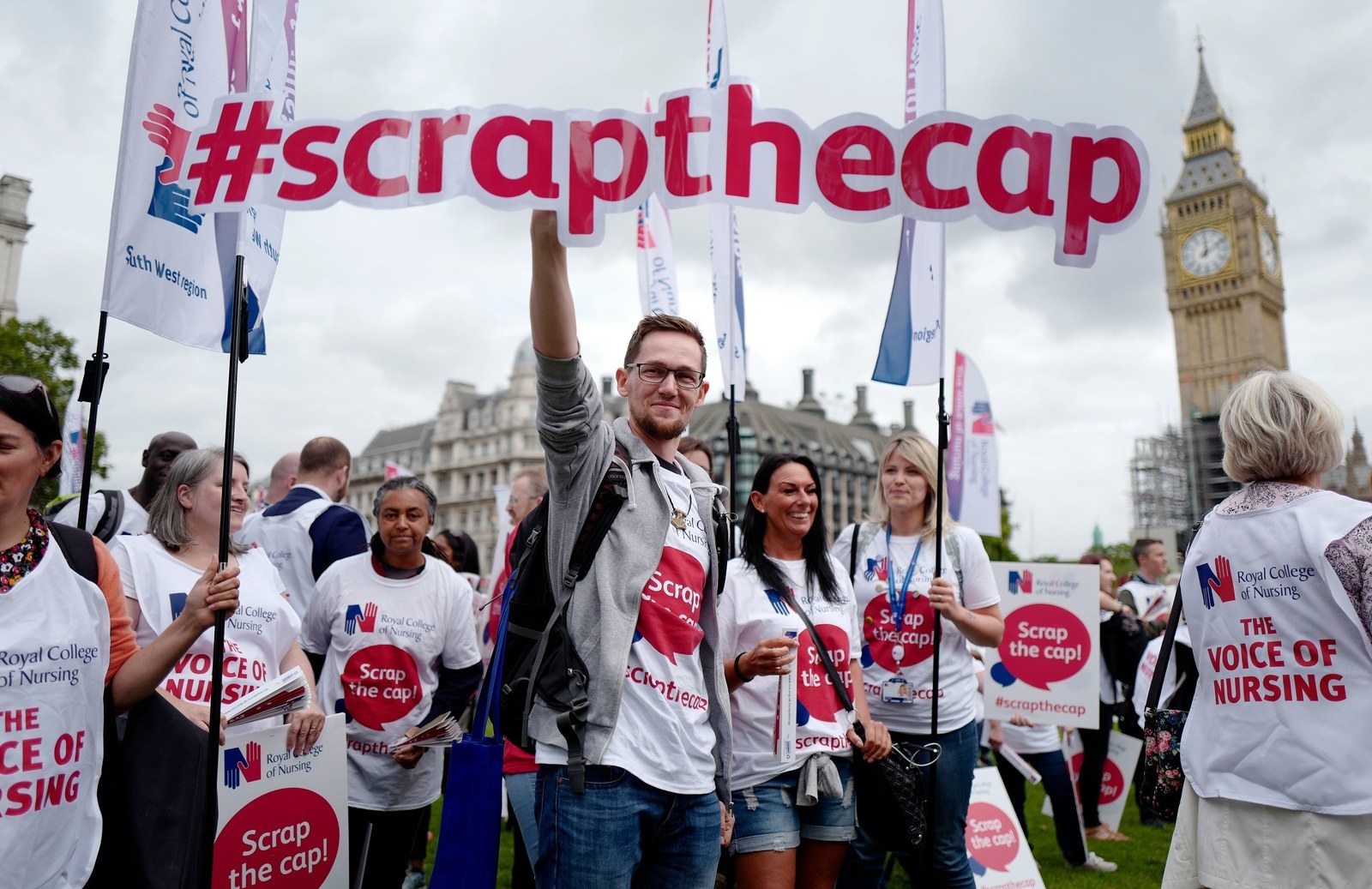
Nurses have repeated their plea for increased wages amid reports that the government is about to ease pay restraints for some other public sector professions.
It emerged on Sunday that ministers are set to accept recommendations for police and prison officers to get pay rises higher than the 1% public sector cap.
But there has been no indication the cap will also be lifted for NHS staff like nurses, despite continued protests and the threat of strike action over the freeze on nursing pay.
As a result of the cap, nurses are, on average, £3,111 a year worse off than they were in 2010, according to analysis by BuzzFeed News. Many say they are struggling to pay basic living costs, and there are reports of some nurses having to use food banks.
Gemma Brimble, a nurse in London, told us she would not be able to get by if it weren't for her husband's salary. "My rent alone is over three-quarters of my wages," she said. "Nurses are being forced to move further and further out of the city while vacancies rise and more money gets spent on agency staff."
Phil Noyes, a mental health nurse from Coventry who has worked in the profession more than 30 years, told BuzzFeed that continuing to cap pay was posing a serious problem for recruiting new people, as well as for retaining newly qualified nurses.
"We need some assurances to try and rebuild the nursing workforce," he said.
According to the latest figures from the Royal College of Nursing, there are around 40,000 nursing vacancies in England right now – a record high.
#scrapthecap is more than just pay, it involves RESPECT. Respect for the great job staff do under increased workload pressure and budgetary
Noyes welcomed the suggestion that police and prison officers could receive more pay, but said nurses also needed an increase to their wages, as well a guarantee that any pay rise would be in line with inflation.
"We’ve been saying 'scrap the cap' because it doesn’t help us much if there’s a 1.5% cap underneath that one." he said. "The real thing is the real cost of living. Any increase below that is still a cap."

Changes to the way student nurses are financed are predicted to have a lasting impact on the high number of vacancies in the profession. After the government confirmed that bursaries for trainee nurses would be replaced with a student loans system from September 2017, applications dropped by 23%.
"Without the bursary, [students are] weighing up whether they can afford to train or not," Noyes said. "So it’s a workforce issue as well as a pay issue."
During a demonstration outside parliament last week, Royal College of Nursing members threatened strike action if more funding for nursing pay was not granted in November's budget.
“We are prepared to take industrial action over the government’s failure to lift the pay cap and we will act,” Danielle Tiplady, a newly qualified nurse, told BuzzFeed News. “No matter what we say or how loud we say it the government seem to just ignore our profession. Enough is enough.”
What's next step @theRCN? The government despite this summer campaign won't #scrapthecap. Are you going to call for… https://t.co/g4OvwXgbXE
Frances O'Grady, general secretary of the Trades Union Congress, said that being granted a pay rise should not be a "popularity contest" among public service professions.
Royal College of Nursing chief executive Janet Davies agreed, urging prime minister Theresa May to "bite the bullet and consign the whole policy to the scrapheap".
“The government is ploughing on with a policy that is driving nursing staff out of the NHS and putting patient care at risk," Davies said.
"If it is not scrapped in the Budget or before, then industrial action goes on the table immediately.”
A spokesperson for May told Sky News on Monday that the public sector pay cap would "continue as planned".
A Department of Health spokesperson said ministers were "well aware" of pressures faced by frontline NHS staff.
"The support and welfare of NHS staff is a top priority, and the government is committed to ensuring they can continue to deliver world-class patient care," the spokesperson said.
"We are helping the NHS to make sure it has the right staff, in the right place, at the right time to provide safe care– that's why there are over 31,100 more professionally qualified clinical staff, including over 11,600 more doctors, and almost 12,000 more nurses on our wards since May 2010."
